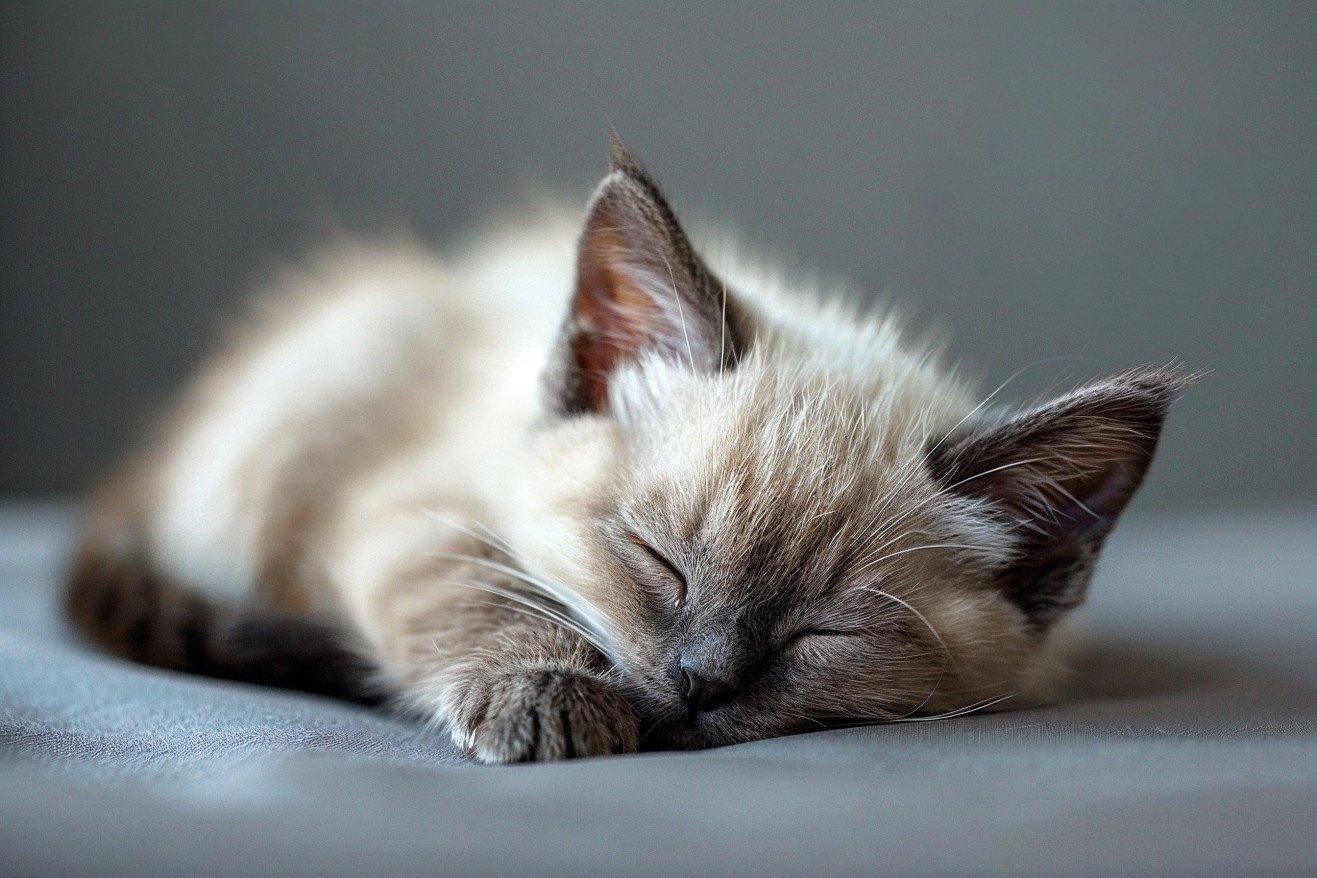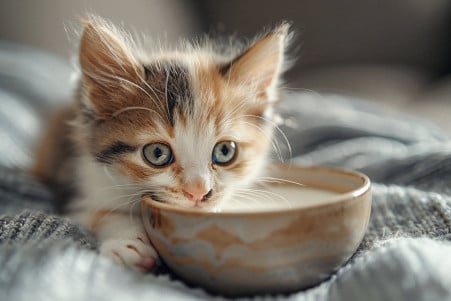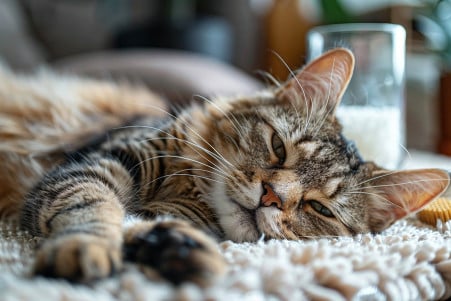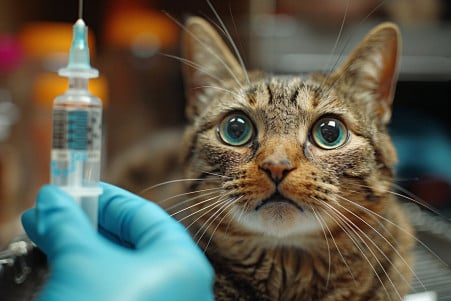What to Feed a Kitten with Diarrhea: Vet-Approved Tips
31 May 2024 • Updated 30 May 2024

If your kitten has diarrhea, you may be concerned, but knowing what to feed them and how to treat them can help you get their tummy issues under control. When it comes to feeding kittens with diarrhea, you should feed them a bland diet that includes things like boiled chicken and rice, canned pumpkin, or a special veterinary diet until the diarrhea clears up - and you should avoid dairy, fatty, and spicy foods that can make their diarrhea worse.
To help you know how to treat kittens with diarrhea, we referenced veterinarians sharing their advice on the best dietary strategies and other treatments. Their explanations of the causes of diarrhea, other treatments you can try at home, when you should go to the vet, and how to prevent diarrhea in the future will help you take care of your kitten when they're dealing with this uncomfortable but common issue. Read on to learn more so you can help your kitten feel better as soon as possible.
What should I feed a kitten with diarrhea?
Why Probiotics and Prebiotics Matter
Probiotics and prebiotics are important for helping a kitten's digestive system heal from diarrhea and get back to normal. Probiotics are live bacteria and yeasts that can help restore the good bacteria in the gut that diarrhea can disrupt, says the National Center for Complementary and Integrative Health. When shopping for a probiotic supplement, make sure to choose one that's made for cats and kittens, since probiotics made for humans can be unsafe and ineffective for cats, according to Purina.
In addition to probiotics, prebiotics like inulin and oligosaccharides can help the gut by feeding the good bacteria, says Optimeal. These supplements can be added to the kitten's food or given to them directly. However, it's important to talk to a vet to get the right dosage information for your kitten.
Although probiotics and prebiotics can help, it can take several days or even weeks to see the full benefits of these supplements when it comes to helping your kitten's digestive system recover, says Purina. It's important to be patient and consistent with the supplements during this time. With the right probiotic and prebiotic supplements, your kitten's gut bacteria can eventually return to normal, making it easier for them to go back to their regular diet.
Transition Back to Regular Food
After the kitten's diarrhea has cleared up, it's important to transition them back to their regular food slowly, says The Spruce Pets. This can be done by mixing their regular food with the bland diet and gradually increasing the amount of regular food over the course of a few days.
Make sure not to change their diet suddenly, as this can cause diarrhea to return. Keep an eye on the kitten's stool and adjust the ratio of foods as necessary. As Preventive Vet explains, it's important to talk to a vet to get personalized advice on the best way to transition the kitten back to their regular food in order to avoid any setbacks.
Electrolyte Solutions and Electrolyte Supplementation
There are some natural remedies that can help calm a kitten's stomach and help with diarrhea. Slippery elm and pumpkin puree are two options that may help, according to the Kitten Lady. Electrolyte solutions made specifically for kittens, such as Kitten Lyte or unflavored Pedialyte, can also help kittens stay hydrated and replace the electrolytes that are lost when they have diarrhea.
It's important to make sure you're using the correct dosage and to talk to a vet before giving any supplements or home remedies to a kitten. If a kitten is dehydrated or has diarrhea that won't go away, they may need to see a vet for treatment, which could include fluids and medications. Over-the-counter anti-diarrheal medications can be dangerous for kittens, so it's important to avoid giving them to kittens unless a vet has recommended them.
Best Kitten Foods for Recovery
When your kitten is recovering from diarrhea, it's important to feed them high-quality kitten foods that are high in fiber and protein to help with their digestive system, according to Catster. Dry foods are often better than wet foods, as they have less moisture and are easier to digest, the article explains.
You'll also want to make sure that the kitten foods you choose have probiotics and prebiotics to help with the gut microbiome, as Optimeal points out. Make sure to introduce new foods slowly and keep an eye on your kitten's reaction to make sure that you're not causing another case of diarrhea. And, as Uptown Vet Hospital explains, it's always best to talk to your vet to get personalized food recommendations based on your kitten's age, weight, and health.
With the right kitten foods and the help of your vet, you can help your kitten get over their diarrhea and back to their normal selves. However, if the diarrhea doesn't go away or your kitten becomes dehydrated, it's important to take them to the vet right away.
When to See a Vet
According to PetMD, if your kitten's diarrhea doesn't clear up after 24-48 hours of at-home treatment, it's time to see a vet. Dehydration symptoms like sunken eyes, dry gums, or listlessness are a sign that you should see a vet immediately. Other signs that your kitten needs to see a vet include severe diarrhea, vomiting, and other serious symptoms.
A vet can help diagnose and treat any underlying causes of diarrhea in kittens, including infections and parasites, according to PetMD. This may involve prescribing medications, making changes to your kitten's diet, and providing supportive care. Make sure to follow your vet's instructions to make sure that your kitten gets the care they need.
Conclusion: How to Help a Kitten With Diarrhea
Kitten diarrhea is a serious issue that needs to be addressed with the right care and attention. To help your kitten recover, start with a bland diet and slowly reintroduce their regular food once their diarrhea has cleared up. You can also help your kitten's gut health by giving them probiotics and prebiotics, and you can use natural remedies and electrolyte solutions as directed by your vet.
Make sure to keep a close eye on your kitten for any signs of dehydration or worsening symptoms, and take them to the vet if their diarrhea doesn't improve with at-home care. With the right care and a little patience, most cases of kitten diarrhea can be treated successfully, allowing your kitten to get back to their normal, healthy self.


